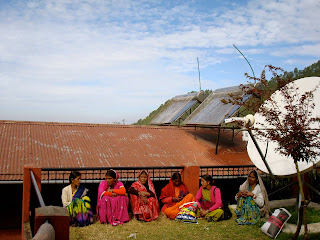This week we celebrate both Diwali and Halloween. Tonight we'll carve green pumpkins, bob for apples, and dress up in whatever costumes we can scrounge from the limited materials around us: travel clothes, pens and paper, the surrounding forest. Keith, who in addition to co-directing this program for the last 7 years, is also a professional baker, is making apple crisp and pumpkin pie.

Keith and Chicu
Kacy and I will dress up as each other. Several years ago, when I was at Terra Madre during Halloween, Kacy went to a party dressed up as herself in 40 years. She wore all my clothes. I didn't take that as a compliment. Now's my chance to return the favor, I suppose.
Every Hindu I've asked about Diwali has a different story about the origins off the holiday. To Southerners it celebrates Ram's defeat of Ravan, when he brought his wife Sita back home from Sri Lanka. To Northerners it's a time to honor the goddess of wealth, Lakshmi. Everyone can agree, though, that Diwali is a family holiday. A time for gathering together with the ones you love, exchanging presents, and eating sweets. It's also a holiday about light. As the nights turn cold, and the darkness falls earlier, we light candles and set off fireworks to celebrate the glory of the sun. A festival a Seattlite could surely enjoy. Here at Sonapani, the staff cooked us an amazing dinner and set off fireworks right over our heads. We also watched the city of Almora on the hills in the distance as it lit up with explosions of color throughout the night.
We've been gone for only a little over a month, and already we have a community of people here whom we care for dearly. Nearly every day we congratulate ourselves on ending up in such a beautiful place, and choosing to start our trip this way- resting in one place for a while, learning a little something about a community, and hopefully giving something back. When we were planning this year, we spent a lot of time dreaming about where we'd like to go. Imagining Fiji and Vietnam and South Africa. But we didn't really think too much about India. It was a given. It was a job.
Now, already, it's much more than a job.

Even with all the things we have here, one thing we're lacking is a comfortable place to sit. We nixed bringing a travel hammock along on this trip. It just didn't seem worth the space and weight for the next 9 months. Clearly we were wrong. Every day when I try to find a good chair to read in, or when Kacy is grading papers hunched over the computer on the bed, we wonder what on earth we could have been thinking.
I suspect we'll learn a lot in the next year about what’s really necessary to us, and what we most want.... from ourselves, from life, from our possessions and surroundings, and from each other.
Alice was the first student to have a birthday party here. The other students made up a song to sing for her.
Tomorrow is Ashley's birthday. I'm sure they'll find something to rhyme with Ashley. Kacy's birthday also happens while we're here. I've told the students they ought to sing something to the tune of Cee-Lo's "Forget You," which was Kacy's Dissertation-finishing song. Though by the time we get to December 11th, Kacy will have been finished with her Dissertation for nearly 6 months. And Dr. McKinney and I will be nearly on our way to Fiji.


















































